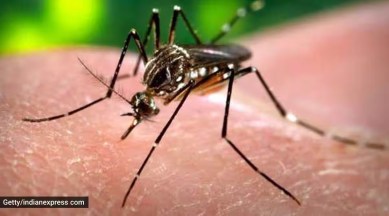📣 For more lifestyle news, click here to join our WhatsApp Channel and also follow us on Instagram
Amid rising dengue cases, experts urge maintaining healthy platelet count
One of the key conditions caused by dengue infection is a decrease in platelet count, a condition known as thrombocytopenia

In recent months, the nation has been grappling with a notable increase in dengue cases, with Delhi registering its highest number of first-week cases for the month of August in the past five years. In July’s final week, 56 cases were reported, but this figure nearly doubled to 105 during the initial week of August. The situation has been exacerbated this year due to the impact of Yamuna’s flooding, leading to a surge in mosquito breeding.
Talking about the same, Dr Anurag Saxena, HOD, internal medicine, Primus Super Speciality Hospital, said that dengue cases have experienced fluctuations over time with several factors contributing to it. “It is believed that the increase in dengue cases is directly linked to the humid and warm climate during the monsoon season,” he said.
monthly limit of free stories.
with an Express account.
As such, it becomes crucial to take proactive measures to prevent the breeding of mosquitoes and to protect ourselves from these diseases. One of the key conditions caused by dengue infection is a decrease in platelet count, a condition known as thrombocytopenia.
“The virus affects the bone marrow and disrupts the production of platelets, leading to a lower-than-normal platelet count. Thrombocytopenia is one of the hallmarks of dengue fever and can contribute to symptoms such as bleeding and bruising,” Dr Saxena said.
Agreeing, Dr Manisha Arora, senior consultant, internal medicine, Sri Balaji Action Medical Institute, shared that the normal platelet count typically ranges from 150,000 to 450,000 platelets per microliter of blood. “A platelet count below 50,000 per microliter of blood is generally considered a cause for concern and may require medical attention,” she said.
Dr Saxena said that extremely low platelet counts can increase the risk of bleeding and other complications. As such, here are some steps that can help potentially mitigate the severity of thrombocytopenia.
*Stay hydrated: Drinking plenty of fluids can help maintain adequate blood volume and circulation, which may support platelet function.
*Rest: Resting and avoiding strenuous activities can help the body conserve energy and allocate resources to fight the infection.
*Nutrition: Consuming a balanced diet rich in vitamins and minerals can support the body’s immune response and overall health.
*Medical care: Seek medical attention promptly if you suspect you have dengue. Early diagnosis and appropriate medical care can help manage symptoms and prevent complications.
*Avoid self-medication: Avoid taking non-prescription medications (such as aspirin) that can increase the risk of bleeding.
*Mosquito control: Prevent further mosquito bites to avoid potential exposure to other dengue virus strains that could exacerbate the illness.
📣 For more lifestyle news, follow us on Instagram | Twitter | Facebook and don’t miss out on the latest updates!
📣 For more lifestyle news, click here to join our WhatsApp Channel and also follow us on Instagram